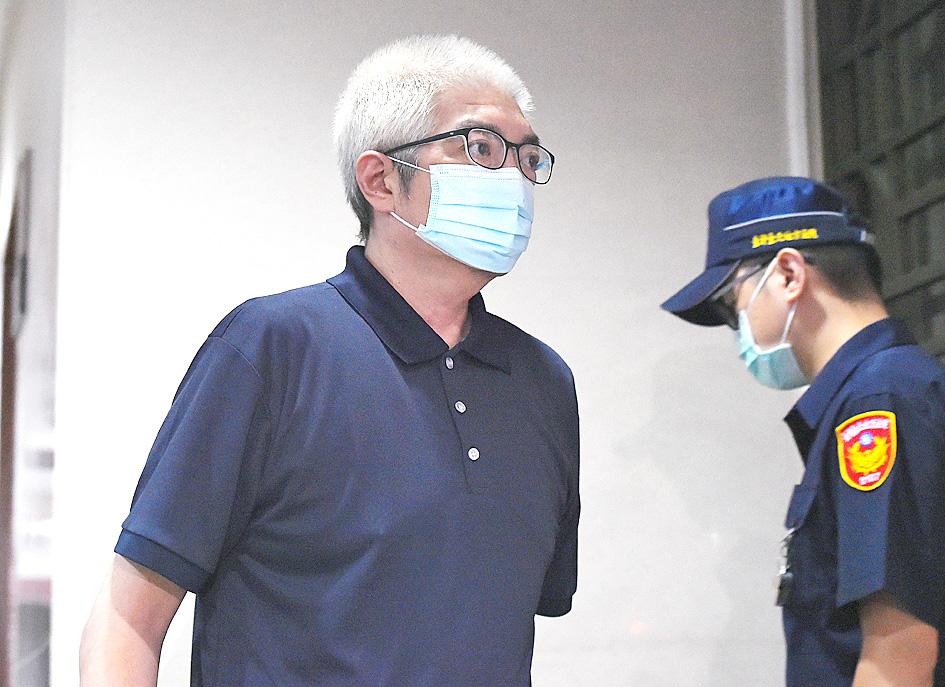The Taipei District Court yesterday sentenced two former aides of Chinese Nationalist Party (KMT) lawmakers to prison for espionage and contravening the National Security Act (國家安全法).
Prosecutors in August last year charged former aides Lin Yung-ta (林雍達), Chen Wei-jen (陳惟仁) and Lee Yi-hsien (李易諴) with stealing classified materials from lawmakers at the legislature and passing them on to their Chinese handler, and for allegedly trying to hack into President Tsai Ing-wen’s (蔡英文) medical records.
Lee died from colon cancer one month later.

Photo: Liao Chen-huei, Taipei Times
Prosecutors said that the trio were recruited by Chinese Ministry of State Security intelligence officer Huang Guanlong (黃冠龍).
The court sentenced Lin to five months in prison for trying to develop a spy network and related charges. The sentence can be commuted to a fine of NT$150,000.
It sentenced Chen to 10 months in prison, which Chen must serve.
In a separate charge of trying to obtain confidential documents for another state, the court gave Chen another three-month prison term, which can be commuted to a fine of NT$90,000.
It was the first ruling in the case and can be appealed.
The judges in their ruling condemned the trio’s activities, saying that China is hostile toward Taiwan, but they took advantage of their jobs at the legislature to help Beijing undermine national security by spying and obtaining classified information.
Lee was an aide to former KMT legislator Chang Li-shan (張麗善), who is now Yunlin County commissioner, while Chen and Lin worked for former KMT legislator Chen Shu-huey (陳淑慧), who is now Chiayi deputy mayor.
Evidence showed that Chen in 2017 offered money to a computer technician working for a government contractor to hack into the National Health Insurance database to obtain medical records and personal information about Tsai and other top officials.
Using their access as legislative aides, the trio collected internal reports and meeting records at the legislature and ministries, with a special focus on the Ministry of Foreign Affairs and the Mainland Affairs Council, an investigation found.
The trio also used their connections with local reporters covering politics to collect confidential material, and compile lists of lawmakers and their office personnel, as well as politicians, government officials, media workers, researchers and other staff at the legislature to be passed on to their Chinese handlers, investigators said.
Chen in 2016 offered NT$200,000 to a research assistant working for a KMT policy think tank to obtain documents about the party’s guidelines and internal decisions on cross-strait relations, they said.
Evidence showed that Chen and Lee in 2016 befriended a journalist who covers police and judicial news, and asked him to gather information from National Police Agency officials about the activities and personal data of Falun Gong practicioners in Taiwan.
Chen also tried to befriend a police officer, surnamed Peng (彭), who worked as a security escort for Democratic Progressive Party (DPP) caucus whip Ker Chien-ming (柯建銘), to access Ker’s office and private rooms, investigators said.
Chen asked Peng to steal internal DPP memos and guidelines on the 2016 presidential election campaign, they said.
Chinese officials recruited Chen in 2012, promising him money, and Chen later that year invited Lin on a trip to Macau, they said.
He then met Huang in Zhuhai, Guangdong Province, agreeing to work for him, and Lee joined in later, as he had debt problems, investigators said.

A decision to describe a Chinese Ministry of Foreign Affairs statement on Singapore’s Taiwan policy as “erroneous” was made because the city-state has its own “one China policy” and has not followed Beijing’s “one China principle,” Deputy Minister of Foreign Affairs Tien Chung-kwang (田中光) said yesterday. It has been a longstanding practice for the People’s Republic of China (PRC) to speak on other countries’ behalf concerning Taiwan, Tien said. The latest example was a statement issued by the PRC after a meeting between Singaporean Prime Minister Lawrence Wong (黃循財) and Chinese President Xi Jinping (習近平) on the sidelines of the APEC summit

Taiwan’s passport ranked 34th in the world, with access to 141 visa-free destinations, according to the latest update to the Henley Passport Index released today. The index put together by Henley & Partners ranks 199 passports globally based on the number of destinations holders can access without a visa out of 227, and is updated monthly. The 141 visa-free destinations for Taiwanese passport holders are a slight decrease from last year, when holders had access to 145 destinations. Botswana and Columbia are among the countries that have recently ended visa-free status for Taiwanese after “bowing to pressure from the Chinese government,” the Ministry

HEALTHCARE: Following a 2022 Constitutional Court ruling, Taiwanese traveling overseas for six months would no longer be able to suspend their insurance Measures allowing people to suspend National Health Insurance (NHI) services if they plan to leave the country for six months would be abolished starting Dec. 23, NHIA Director-General Shih Chung-liang (石崇良) said yesterday. The decision followed the Constitutional Court’s ruling in 2022 that the regulation was unconstitutional and that it would invalidate the regulation automatically unless the NHIA amended it to conform with the Constitution. The agency would amend the regulations to remove the articles and sections that allow the suspension of NHI services, and also introduce provisional clauses for those who suspended their NHI services before Dec. 23, Shih said. According to

Minister of Labor Ho Pei-shan (何佩珊) yesterday apologized after the suicide of a civil servant earlier this month and announced that a supervisor accused of workplace bullying would be demoted. On Nov. 4, a 39-year-old information analyst at the Workforce Development Agency’s (WDA) northern branch, which covers greater Taipei and Keelung, as well as Yilan, Lienchiang and Kinmen counties, was found dead in their office. WDA northern branch director Hsieh Yi-jung (謝宜容), who has been accused of involvement in workplace bullying, would be demoted to a nonsupervisory position, Ho told a news conference in Taipei. WDA Director-General Tsai Meng-liang (蔡孟良) said he would